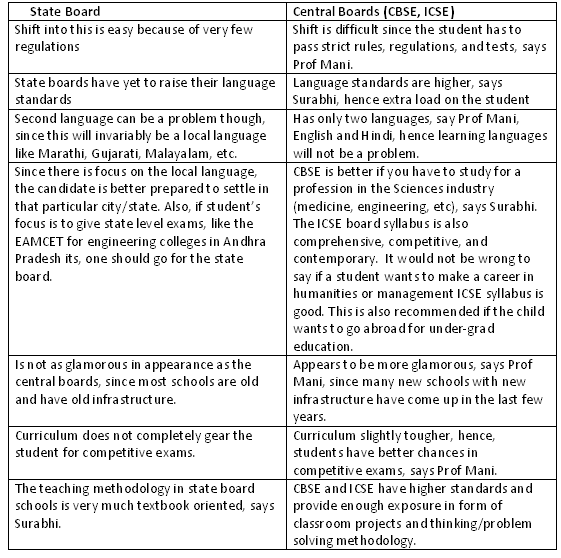Shilpa Shet
Moving your child from one board to another can be quite a task. Here's how you can go about it.
Long afternoon naps; a full night's sleep; frenzied and exciting chats with friends; weekend movies, jaunts, and treks -- these are some activities that some standard 10 students are just getting used to.
After a grueling year of studying and slogging, they are now on the throes of a tension-free period. Or are they?
For even as the standard 10 exams are over, the students and largely their parents have started wondering (and worrying) about their "future". Discussions with family friends, relatives center largely around the competition, the competitive exams, and what the student should do to cope with it all.
And so the worried parent stays worried especially if there are some drastic steps to be taken. For example, what if the student has to shift boards?
Naina Samuel, a parent says, "My son wants to get into engineering. He has always studied in the state board. But someone recently told us that may be he needs to shift to CBSE. Apparently, CBSE will help him do better in the engineering entrance tests. We are considering that option now."
The major boards in the country are the state boards and the central boards (CBSE and ICSE). Other boards (IB, IGCSE, ISC) are not so popular as yet but there are some parents who consider these too.
Illustration: Dominic Xavier
State Boards vs Central Boards
The parents know a shift will not be easy. Counselors, however, say differently. "Shifting into state board is easy," says Prof RSS Mani, an education counselor, "However, shifting from CBSE and ICSE to the state board is not very easy."
An opinion reverberated by Surabhi Dewra, from Mera Career Guide. Says she, "Switching from State Board to CBSE board or ICSE board can bring certain pressure on students to keep pace with the syllabus and curriculum. "
Ask for the reason and the entire State Board-vs-Central Board can of worms spills.
Here's a quick reference guide on the two boards:

Shifting Made Easy
Image: Don't follow the herd while deciding on your board. Shifting at the right time can make a differenceConsidering the entire commercial nature of education, it is not surprising that the students can change boards easily. With help, of course.
From the points given in the previous slide, shift into state boards is easy.
Prof Mani recommends, "Pressure in state board is lesser, so it is recommended you move to state board and get good coaching for the competitive exams."
Surabhi agrees. She says, "Usually students change board to the state board after 10 as it's fairly easy to score in exams owing to a text-book-oriented curriculum. This also leaves them with ample time to prepare for competitive exams."
However, the shift to the central boards can also be tutored. If the student wants to shift to CBSE and ICSE, he or she will have to take extra help and coaching.
The ideal time to shift boards is either standard eight or nine, says Prof Mani. He adds, "It doesn't matter which board you study in. No child today goes into a competitive exam without coaching classes."
Other Boards
There are schools offering international curriculum and the boards typically are the International General Certificate of Secondary Education (IGCSE) and the International Baccalaureate (IB).
Parents generally opt for these boards right at the beginning of their child's academics and/or when they foresee moving to a foreign destination.
What are the implications of shifting to such boards?
Surabhi elaborates, "Most international schools in India offer a combination of the ICSE, IGCSE, and IB. These have an international curriculum and truly imbibe intercultural awareness. Such an educational experience is missing in purely national curricula such as CBSE and ICSE or even the state boards. "
As for how the syllabus is different, she adds, "Students actually see application of Maths and Science theories. This kind of curriculum inculcates skills like problem solving abilities, debating, experimenting, analyzing, and reflecting. "
The biggest advantage of these boards is that your child can easily get admission in another IB school world-over.
A sore point could be that these boards give less importance to national and local languages. Also, your child will probably be learning different things and things differently than the local curricula.
Shifting to and from one of these international boards after standard ten is difficult (almost impossible), because of their differently structured curriculum and even standards. This decision has to be made in the first few formative years of the child's education.
Beware
Prof Mani says that parents need to beware of relatives and friends. "These merely add to the pressure. If a parent wants to shift boards, please talk to a counselor," he adds.
Illustration: Uttam Ghosh



Comment
article